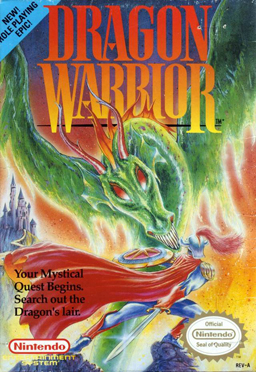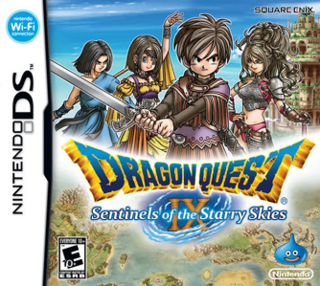Related Research Articles

Games Workshop Group is a British manufacturer of miniature wargames, based in Nottingham, England. Its best-known products are Warhammer and Warhammer 40,000.
Dragon Quest, previously published as Dragon Warrior in North America until 2005, is a series of role-playing games created by Japanese game designers Armor Project, Bird Studio and Sugiyama Kobo to its publisher Enix, with all of the involved parties co-owning the copyright of the series since then. The games are published by Square Enix since its inception, with localized remakes and ports of later installments for the Nintendo DS, Nintendo 3DS, and Nintendo Switch being published by Nintendo outside of Japan. With its first game published in 1986, there are eleven main-series games, along with numerous spin-off games. In addition, there have been numerous manga, anime and novels published under the franchise, with nearly every game in the main series having a related adaptation.

Koichi Sugiyama was a Japanese composer, conductor, and orchestrator. He was best known for composing the music for the Dragon Quest franchise, along with several other video games, anime, film, television shows, and pop songs. Classically trained, Sugiyama was considered a major inspiration for other Japanese game music composers and was active from the 1960s until his death from septic shock in 2021.

Itadaki Street is a party video game series originally created by Dragon Quest designer Yuji Horii. It is currently owned by Square Enix. The first game was released in Japan on Nintendo's Famicom console in 1991. Since then, new installments in the series have been released for the Super Famicom, PlayStation, PlayStation 2, PlayStation Portable, Nintendo DS, Mobile Phones, Android, iOS, PlayStation 4 and PlayStation Vita. The series was exclusive to Japan prior to the 2011 Itadaki Street Wii, which is released as Fortune Street in North America and Boom Street in Europe.

HeroQuest, is an adventure board game created by Milton Bradley in conjunction with the British company Games Workshop in 1989, and re-released in 2021. The game is loosely based around archetypes of fantasy role-playing games: the game itself was actually a game system, allowing the gamemaster to create dungeons of their own design using the provided game board, tiles, furnishings and figures. The game manual describes Morcar/Zargon as a former apprentice of Mentor, and the parchment text is read aloud from Mentor's perspective. Several expansions have been released, each adding new tiles, traps, artifacts, and monsters to the core system.

Dragon Quest IV: Chapters of the Chosen, titled Dragon Warrior IV when initially localized to North America, is a role-playing video game, the fourth installment of the Dragon Quest video game series developed by Chunsoft and published by Enix, and the first of the Zenithian Trilogy. It was originally released for the Famicom on 11 February 1990 in Japan. A North American NES version followed in October 1992, and would be the last Dragon Quest game localized and published by Enix's Enix America Corporation subsidiary prior to its closure in November 1995, as well as the last Dragon Quest game to be localized into English prior to the localization of Dragon Warrior Monsters in December 1999. The game was remade by Heartbeat for the PlayStation, which eventually was available as an Ultimate Hits game. The remake was ported by ArtePiazza to the Nintendo DS, released in Japan November 2007 and worldwide in September 2008. A mobile version based on the Nintendo DS remake was released in 2014 for Android and iOS.

Dragon Quest, titled Dragon Warrior when initially localized to North America, is a role-playing video game developed by Chunsoft and published by Enix for the Nintendo Entertainment System. It was originally released in Japan in 1986 and by Nintendo in North America in 1989. It is the first game in the Dragon Quest video game series. Dragon Quest has been ported and remade for several video game platforms, including the MSX, MSX2, PC-9801, Super Famicom, Game Boy Color, Nintendo 3DS, PlayStation 4, mobile phones, and Nintendo Switch as of 2019. The player controls the hero character who is charged with saving the Kingdom of Alefgard and rescuing its princess from the evil Dragonlord. Dragon Warrior's story became the second part in a trilogy, with several spinoff anime and manga series.

Castlevania II: Simon's Quest is a platform-adventure game developed and published by Konami. It was originally released in Japan in 1987 for the Famicom Disk System, and in North America in 1988 for the Nintendo Entertainment System. It is the second Castlevania game released for the NES, following the original Castlevania (1986). Set seven years after the events of the first installment, the player once again assumes the role of vampire hunter Simon Belmont, who is on a journey to undo a curse placed on him by Dracula at the end of their previous encounter. Dracula's body was split into five parts, which Simon must find and bring to the ruins of Castle Dracula in order to defeat him. The game deviates from the traditional platforming of its predecessor, incorporating role-playing and open world elements.

Francis Gregory Stafford was an American game designer, publisher, and practitioner of shamanism.

Slimes are a fictional species of monster in the Dragon Quest role-playing video game franchise. Originally inspired by the game Wizardry to be a weak and common enemy for the 1986 video game Dragon Quest, Slimes have appeared in almost every Dragon Quest game since. Their popularity led to the appearance of many varieties of Slimes, including boss characters, friendly allies, and even emerging as the protagonist of the Rocket Slime video game series. Slimes have also appeared in other video game properties, including Nintendo's Mario and Super Smash Bros. series of crossover fighting games.

Space Quest: Chapter I – The Sarien Encounter is a graphic adventure game, created by Scott Murphy and Mark Crowe, and released in October 1986 by Sierra On-Line. It is the first game in the Space Quest series, and sees players assume the role of a lowly janitor on a research ship, who becomes involved in stopping an alien race using a new form of technology for evil purposes.

Proviso West High School (PWHS) is a public high school located in Hillside, Illinois, United States. It is a part of Proviso Township High Schools District 209, and was opened in 1958. Its sister schools are Proviso East High School and Proviso Mathematics and Science Academy.
The Dungeons & Dragons (D&D) fantasy role-playing game has been adapted into many related products, including magazines, films and video games.

Dragon Quest IX: Sentinels of the Starry Skies is a role-playing video game co-developed by Level-5 and Square Enix for the Nintendo DS. Published by Square Enix in Japan in 2009, and by Nintendo overseas in 2010, it is the ninth mainline entry in the Dragon Quest series. The storyline follows the protagonist, a member of the angelic Celestrian race, after a disaster in their home scatters magical fruits across the mortal realm. While carrying over traditional gameplay from the rest of the series with turn-based battles, the game is the first Dragon Quest entry to feature a customizable player character, and the first to include a multiplayer mode, with the option of trading treasure maps and loaning player characters through Nintendo Wi-Fi. Online functions ended in 2014 when it ceased operations.

Quest Corporation was a Japanese video game company founded in 1988. Quest is best known for its critically acclaimed tactical role-playing game series Ogre Battle.

Dragon Quest: Monster Battle Road is a series of Japanese arcade games based on Dragon Quest VIII: Journey of the Cursed King. Players battle monsters and can win real-life cards with monster data imprinted on them. The first game, also titled Dragon Quest: Monster Battle Road, was released in 2007 only in Japan, using the Taito Type X2 system. A sequel, Dragon Quest: Monster Battle Road II Legends, was announced at the 2009 Jump Fiesta in Tokyo, and a third game in the series, Dragon Quest: Monster Battle Road Victory, a port of the Legends game, was announced for the Wii in 2010. Dragon Quest: Monster Battle Road Scanner was scheduled for release in the arcade in 2016.

Koei Tecmo Holdings Co., Ltd. is a Japanese video game, amusement and anime holding company created in 2009 by the merger of Koei and Tecmo. Koei Tecmo Holdings owns several companies, the biggest one of those being its flagship video game developer and publisher Koei Tecmo Games that was founded in 1978 as Koei.

Puzzle Quest 2 is a video game developed by Infinite Interactive for the Nintendo DS, Xbox Live Arcade, iOS, Android, Windows Phone 7, and Microsoft Windows. It was released on June 22, 2010 by D3 Publisher. A version for the PlayStation Portable was in development, but was cancelled due to sound bugs. It is the sequel to Puzzle Quest: Challenge of the Warlords, and like its predecessor, it combines role-playing with strategy and puzzle elements. It uses a competitive, Bejeweled-style, "match three game" playfield to simulate combat and other activities common to role-playing games.

The Japanese video game magazine Famitsu reviews video games by having four critics each assign the game a score from 0 to 10, with 10 being the highest score. The scores of are then added together for a maximum possible score of 40. As of 2024, thirty games have received perfect scores from Famitsu.
References
- ↑ "New board game Quest tests many aptitudes". Minneapolis Star-Tribune. 1988. Archived from the original on 2011-06-08. Retrieved 2010-01-11.
- ↑ "Select Gifts That Will Fit Well In Student's Dorm". The Dispatch. 1987. Archived from the original on 2016-01-30. Retrieved 2010-01-11.
- ↑ "CHRISTMAS COMES EARLY TO THE TACOMA DOME". Seattle Post-Intelligencer. 1986. Retrieved 2010-01-11.[ dead link ]